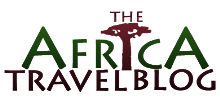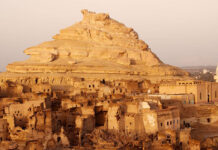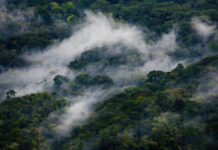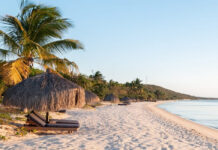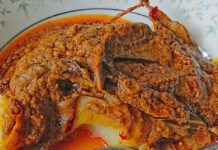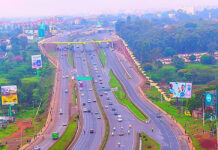Botswana, officially the Republic of Botswana (Tswana: Lefatshe la Botswana), is a landlocked country located in Southern Africa. The citizens refer to themselves as “Batswana” (singular: Motswana), but many English-language sources use “Botswanan” instead. Formerly the British protectorate of Bechuanaland, Botswana adopted its new name after becoming independent within the Commonwealth on 30 September 1966. It has held free and fair democratic elections since independence.
Botswana is flat, and up to 70% is covered by the Kalahari Desert. It is bordered by South Africa to the south and southeast, Namibia to the west and north, and Zimbabwe to the northeast. Its border with Zambia to the north near Kazungula, Zambia is poorly defined but at most is a few hundred meters long.
Botswana Country Information:
Capital
(and largest city) Gaborone
25°40′S 25°55′E
Official languages
English
Setswana
Ethnic groups
79% Batswana
11% Kalanga
3% Basarwa
3% Kgalagadi
3% White African
1% others
Demonym
Batswana
Motswana
Government Parliamentary republic
– President Ian Khama
– Vice President Ponatshego Kedikilwe
Legislature National Assembly
Independence
– from the United Kingdom 30 September 1966
Area
– Total 581,730 km2 (47th)
224,610 sq mi
– Water (%) 2.6
Population
– 2010 estimate 2,029,307 (144th)
– 2001 census 1,680,863
– Density 3.4/km2 (229th)
8.9/sq mi
GDP (PPP) 2011 estimate
– Total $29.707 billion
– Per capita $16,029
GDP (nominal) 2011 estimate
– Total $17.570 billion
– Per capita $9,480
Gini (1993) 63 (high)
HDI (2010) Increase 0.633 (medium) (98th)
Currency Pula (BWP)
Time zone Central Africa Time (UTC+2)
– Summer (DST) not observed (UTC)
Drives on the left
Calling code +267
ISO 3166 code BW
Internet TLD .bw
International Travel
The best way to gain entry into Botswana is through Johannesburg International Airport. The national airline is Air Botswana and it provides regular flights from Johannesburg, Harare and Victoria falls. South African Airways and British Airways also provide flights from Johannesburg to Gaborone. The main airport is Sir Seretse Khama International Airport, 15km from Gaborone. Other airports that receive international flights are Kasane, Selebi-Phikwe, Francistown and Maun International Airports. The road system in Botswana is relatively good thus providing easy access to the neighboring countries. Most of the roads are tarmac. Mini-buses provide the easiest means of road travel. They depart daily during the morning hours from the main bus station in Gaborone to Johannesburg. There are also good roads connecting Botswana to Zimbabwe, Zambia and Namibia. Railway transport is limited to between Botswana and South Africa and Botswana and Zimbabwe. There are plans to extend the connection to Namibia. There is also a ferry that provides a link to Zambia from Botswana over the Zambezi River.
Local Travel
There are scheduled regular flights between the major cities of Botswana. Charter companies such as Delta Air, Moremi Air services amongst others provide flights to various lodges within Botswana. However this services fall on the expensive side. There are also several bus routes and good train lines between major towns that provide cheaper services. Work on extending the rail network is in progress. There are good tarmac roads linking major towns but gravel roads and sand tracks also exist. Plans to construct more major highways are underway. Taxi services are mainly available in major towns. Care should be exercised in negotiating prices before embarking on journeys using this means. For those who prefer to drive themselves, car hire services are available and especially for 4-wheel drive cars which are necessary in many areas. Traffic drives on the left and wearing of seat belts is mandatory. An International Driving Permit is recommended, though not a legal requirement, for stays up to six months. A UK license is also valid. For periods longer than six months, a Botswana license must be obtained and can be issued without a test if a valid UK license is produced. Public transport consists of share taxis or minibus services operating at controlled flat fares.
Visas
All visitors must hold a passport that is valid for at least six months, except those with UN Convention travel documents. Visas are not required by nationals of Commonwealth countries except those of Ghana, India, Nigeria, and Pakistan; nationals of European countries except those of Czech Republic, Poland, Hungary; nationals from USA, Canada and Japan. Nationals of Iceland, Switzerland and Norway also require visas. The validity of visas by nationals the require them is 90 days. Extensions can only be obtained from immigration offices in Botswana. Visitors must also have outgoing travel documents such as return air tickets and adequate funds to finance their stay. Note that visa requirements vary from time to time and you are advised to check on prevailing status well ahead of travel.
Health
Botswana is generally not a risky place to visit health wise. However certain precautions should be taken. Visitors coming from areas where yellow fever is endemic should be inoculated two weeks prior to travel. Malaria is prevalent in the northern parts of Botswana (Chobe, Okavango, Boteti, Ngamiland and Tutume districts/sub districts) especially during the rainy season. It is imperative that one takes anti-malarial drugs two weeks prior to their visit. Protective clothing, nets and insect repellants are also recommended as preventive measures.
Typhoid fever is also common through out the region and especially outside the cities. Vaccination before travel is advisable and care should be exercised in handling food and drink. Tap water within the cities is safe to drink but outside the cities sterilization is advisable. Mineral water is available and can be bought instead. Milk, other dairy products, local meat and other foods, fruits and vegetables are safe for consumption. Other risks are hepatitis A, B, and C, tuberculosis and Bilharzia. Trypanosomiasis (sleeping sickness) is transmitted by tsetse flies in the western part of Chobe National Park, Ngamiland and Moremi Wildlife reserve. Again, protective clothing, nets and insect repellants are essential. To prevent getting bilharzia, avoid swimming or paddling in fresh water; well-chlorinated swimming pools are safer. There is also a high prevalence of HIV/AIDS and appropriate measures should be taken.
Dust and heat may present a problem to people with asthma and allergies. Hats and sunscreen are recommended especially for those with fair skin. There are different kinds of health facilities available; 23 district health teams, 3 referral hospitals in Francistown, Gaborone and Lobatse, 12 district hospitals, 17 primary hospitals, 222 clinics, 330 health posts and 740 mobile stops. Medicine provided at government hospitals is free. There is also a private hospital in Gaborone and also several private medical practitioners. All main towns have well stocked chemists.
Communications
Telephone, mobile phones, fax, Internet, telegram and fax facilities are available in urban centers but are limited in the wildlife areas. The country code is 267. Mobile phones are based on GSM 900 network. Coverage is limited to the main inhabited areas. Postal services are slow but cheap and are available in all towns and larger villages. The daily newspaper is Dikgang tsa Gompieno (The Daily News) published in Setswana and English. Other English newspapers are Mmegi (The Reporter), The Botswana Gazette amongst others. Radio services form BBC World Service and Voice Of America can be received though the frequencies may sometimes change and the current ones can be found online.
Money
The unit of currency is the Pula (P), which is divided into 100 Thebe (t). Most hotels and lodges accept major credit cards like Visa, MasterCard, American Express and Diners Club. They also accept travelers cheques in US Dollars or Pounds Sterling. Exchange bureaus and credit card advances through banks such as Barclays and Standard Chartered are available in major cities. Cash transfers are easiest and safest done through Western Union money transfer. There are no restrictions on import of local or foreign currencies into the country but amounts larger or equivalent to P10, 000 have to be declared on arrival. Banking services are available in full in all major towns while in remote towns, there are traveling banks available weekly or monthly and they deal more with travelers cheques than with cash. Tipping in hotels and restaurants is not necessary but about 10% should be sufficient.
Peoples & Culture
The people of Botswana are divided into several ethnic groups. The largest group is the Batswana. It comprises three major tribes, the Bakwena, Bangwato and Bangwaketse. Other tribes include the Bahurutshe, Barolong, Batawana, Bakgatla, Bakhurutshe, Bateti, Bayei, Basubiya, Bambukushu, Bakgalagadi, Basarwa (Bushmen) and Bakgothu or KhoeKhoe. English is the official language but Setswana is the most commonly spoken. Some knowledge of it would prove useful. Millet and sorghum porridge is the main dish. You will also come across morama, an under ground tuber, Kalahari truffle which is an edible fungus and mopane worm, a caterpillar-like grub. Traditional brews include palm wine, kgadi (made from distilled sugar or fungus) and bojalwa (cheap sorghum beer). If one is not adventurous enough to taste these culinary delights, the standard of food in most hotels and lodges is very good. Christianity and Islam are practiced in Botswana but many of the people still practice the traditional animist beliefs.
Climate
Botswana’s climate is semi-arid. The rainy season is experienced during the summer months, i.e. November to March. Very high temperatures are experienced (they rise to 38 degrees and can reach 44 degrees in rare occasions). Rainfall is erratic, unpredictable and highly regional but it helps in cooling things down. The Setswana word for rain is Pula after which their currency is also named. Rainfall decreases in amount the further west and south you go; mean annual rainfall varies from a maximum of over 650mm in the extreme northeast region of Chobe district to a minimum of less than 250mm in the extreme southwest part of Kgalagadi district. The winter season occurs between May and August. This is the dry season. The days are sunny and cool however night temperatures can drop to below freezing point in some part like the Kalahari. Frost is also common during this period. The in-between periods (April to October) are the best visiting periods. Climate is dry but cooler than in summer and warmer than in winter. Extreme temperatures are not experienced during this period making the conditions favorable for tourists.
Travel Insurance
Health insurance is essential. It is advisable to have a comprehensive travel insurance policy, which covers you for repatriation to your country. You should also find out whether your insurance plan will pay directly for your health expenditures or reimburse you later.
What to Wear
Light clothing is preferable during the day especially during the summer months. Sun block, sunglasses and hats are essential especially for those with fair skin. Warm clothes should also be carried due to colder nights during the winter season and incase of rain, which is frequent during the summer, a raincoat will be considered a good investment. Bright colored clothes should be avoided especially during safaris to prevent any undue attention from wild animals. Natural, earthy or khaki tones are preferable. Campers are advised to carry warm sleeping bags and insect repellants will prove useful out there in the bush. When walking in the bush, long sleeves, long trousers and closed shoes will prevent you from getting tick and mosquito bites.
Accommodation
Accommodation mainly comprises hotels, safari lodges and camping. There is no grading system for the hotels but they all generally maintain reasonable standards and have the basic amenities. Majority of safari lodges in Botswana are found in Chobe National Park, Moremi Game Reserve and Okavango Delta. The standards in these are generally high with some having permanent structures and others having tents. There are also designated camping sights in these game reserves. However campers should exercise care when in these areas, especially at night, due to presence of wild animals. Camping is not allowed on private land unless prior permission is sought.
